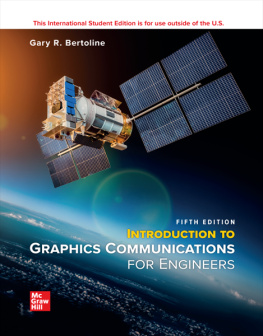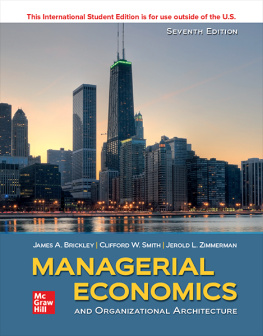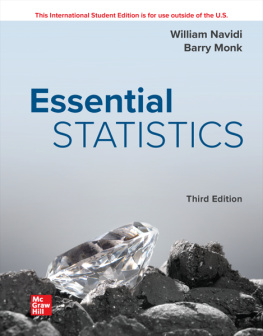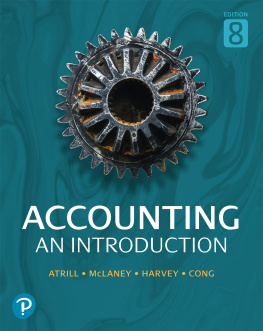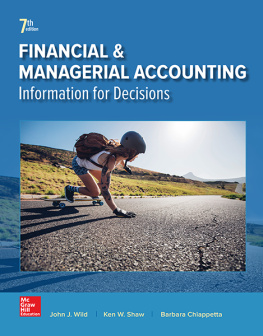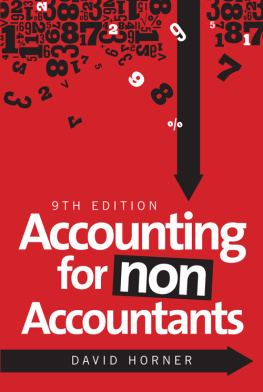Pages

page ii

INTRODUCTION TO MANAGERIAL ACCOUNTING
Published by McGraw Hill LLC, 1325 Avenue of the Americas, New York, NY 10121. Copyright 2022 by McGraw Hill LLC. All rights reserved. Printed in the United States of America. No part of this publication may be reproduced or distributed in any form or by any means, or stored in a database or retrieval system, without the prior written consent of McGraw Hill LLC, including, but not limited to, in any network or other electronic storage or transmission, or broadcast for distance learning.
Some ancillaries, including electronic and print components, may not be available to customers outside the United States.
This book is printed on acid-free paper.
1 2 3 4 5 6 7 8 9 LWI 24 23 22 21
ISBN 978-1-265-67200-3
MHID 1-265-67200-8
Cover Image: wavebreakmedia/Shutterstock
All credits appearing on page or at the end of the book are considered to be an extension of the copyright page.
The Internet addresses listed in the text were accurate at the time of publication. The inclusion of a website does not indicate an endorsement by the authors or McGraw Hill LLC, and McGraw Hill LLC does not guarantee the accuracy of the information presented at these sites.
mheducation.com/highered
page iii
DEDICATION
To our families and to our many colleagues who use this book.
page iv
About the Authors

Peter C. Brewer
Peter C. Brewer teaches in the Department of Accountancy at Wake Forest University. Prior to joining the faculty at Wake Forest, he was an accounting professor at Miami University for 19 years. He holds a BS degree in accounting from Penn State University, an MS degree in accounting from the University of Virginia, and a PhD from the University of Tennessee. He has published more than 40 articles in a variety of journals, including Management Accounting Research, the Journal of Information Systems, Cost Management, Strategic Finance, the Journal of Accountancy, Issues in Accounting Education, and the Journal of Business Logistics.
Professor Brewer has served on the editorial boards of the Journal of Accounting Education and Issues in Accounting Education. His article Putting Strategy into the Balanced Scorecard won the 2003 International Federation of Accountants Articles of Merit competition, and his articles Using Six Sigma to Improve the Finance Function and Lean Accounting: Whats It All About? were awarded the Institute of Management Accountants Lybrand Gold and Silver Medals in 2005 and 2006. He has received Miami Universitys Richard T. Farmer School of Business Teaching Excellence Award.
Prior to joining the faculty at Miami University, Professor Brewer was employed as an auditor for Touche Ross in the firms Philadelphia office. He also worked as an internal audit manager for the Board of Pensions of the Presbyterian Church (USA).
page v

Ray H. Garrison
Ray H. Garrison is emeritus professor of accounting at Brigham Young University, Provo, Utah. He received his BS and MS degrees from Brigham Young University and his DBA degree from Indiana University.
As a certified public accountant, Professor Garrison has been involved in management consulting work with both national and regional accounting firms. He has published articles in The Accounting Review, Management Accounting, and other professional journals. Innovation in the classroom has earned Professor Garrison the Karl G. Maeser Distinguished Teaching Award from Brigham Young University.

Eric W. Noreen
Eric W. Noreen has taught at INSEAD in France and the Hong Kong Institute of Science and Technology and is emeritus professor of accounting at the University of Washington. Currently, he is the Accounting Circle Professor of Accounting, Fox School of Business, Temple University.
He received his BA degree from the University of Washington and MBA and PhD degrees from Stanford University. A Certified Management Accountant, he was awarded a Certificate of Distinguished Performance by the Institute of Certified Management Accountants.
Professor Noreen has served as associate editor of The Accounting Review and the Journal of Accounting and Economics. He has numerous articles in academic journals, including the Journal of Accounting Research; The Accounting Review; the Journal of Accounting and Economics; Accounting Horizons; Accounting, Organizations and Society; Contemporary Accounting Research; the Journal of Management Accounting Research; and the Review of Accounting Studies.
Professor Noreen has won a number of awards from students for his teaching.
page vi
Pointing Students in the Right Direction
Why do I need to learn Managerial Accounting?
Brewers Introduction to Managerial Accounting has earned a reputation as the most accessible and readable book on the market, while leveraging assets from the Garrison Managerial Accounting franchise. Its manageable chapters and clear presentation point students toward understanding just as the needle of a compass provides direction to travelers.
However, the books authors also understand that everyones destinations are different. Some students will become accountants, while others are destined for careers in management, marketing, or finance. Not only does the Brewer text teach students managerial accounting concepts in a clear and concise way, but it also asks students to consider how the concepts theyre learning will apply to the real-world situations they will eventually confront in their careers. This combination of conceptual understanding and the ability to apply that knowledge directs students toward success, whatever their final destination happens to be.
Heres how your colleagues have described Brewers Introduction to Managerial Accounting:
This is the best introductory managerial accounting textbook that I know of. It is concise, easy to follow, and comes with a number of useful materials. I like this book especially because it is very much student-oriented.
Minwoo Lee, Western Kentucky University
Brewer has always been an outstanding text and this newest edition continues the tradition while providing excellent options for students to utilize to enhance their learning and creative options for instructors to enhance their presentations.
Diane Marker, University of Toledo
Great, readable text with streamlined coverage. The number of chapters combined with the readability make this a lean, up-to-date product.
Timothy Griffin, Hillsborough Community College
A book with an appropriate level of coverage for students who may not all be majoring in accounting. This book has enough detail for accounting majors, with coverage that still keeps the interest and understanding of non-majors.
Dawn McKinley, Harper Community College
Ground breaking, aimed at making it easy for students to appreciate the concepts and material.



